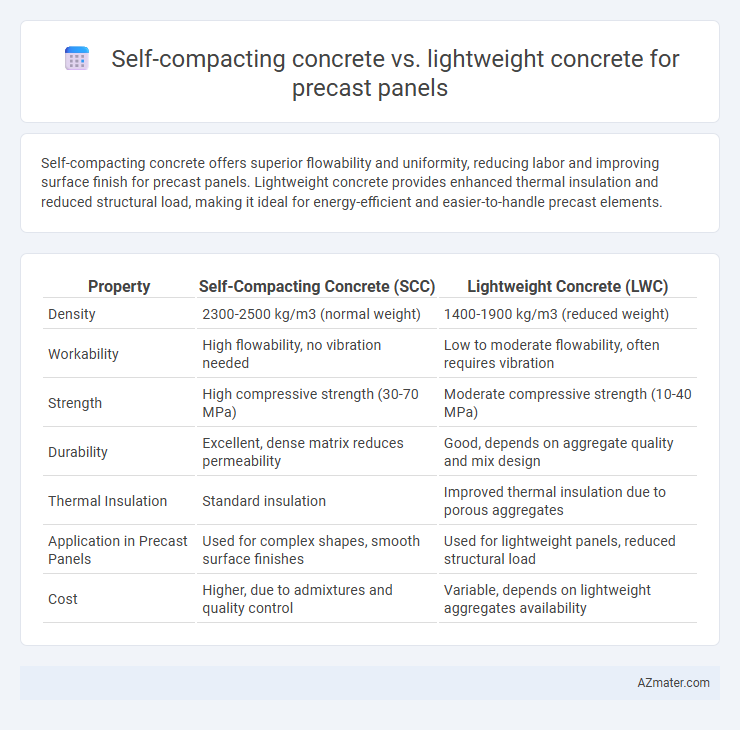Self-compacting concrete offers superior flowability and uniformity, reducing labor and improving surface finish for precast panels. Lightweight concrete provides enhanced thermal insulation and reduced structural load, making it ideal for energy-efficient and easier-to-handle precast elements.
Table of Comparison
| Property | Self-Compacting Concrete (SCC) | Lightweight Concrete (LWC) |
|---|---|---|
| Density | 2300-2500 kg/m3 (normal weight) | 1400-1900 kg/m3 (reduced weight) |
| Workability | High flowability, no vibration needed | Low to moderate flowability, often requires vibration |
| Strength | High compressive strength (30-70 MPa) | Moderate compressive strength (10-40 MPa) |
| Durability | Excellent, dense matrix reduces permeability | Good, depends on aggregate quality and mix design |
| Thermal Insulation | Standard insulation | Improved thermal insulation due to porous aggregates |
| Application in Precast Panels | Used for complex shapes, smooth surface finishes | Used for lightweight panels, reduced structural load |
| Cost | Higher, due to admixtures and quality control | Variable, depends on lightweight aggregates availability |
Introduction to Precast Panels
Precast panels are widely used in construction for their durability, speed of installation, and quality control advantages. Self-compacting concrete (SCC) offers superior flowability and filling ability without the need for vibration, making it ideal for complex and dense reinforcement in precast panels. Lightweight concrete reduces the overall panel weight, enhancing ease of handling and transport while providing improved thermal insulation properties crucial for energy-efficient building envelopes.
Overview of Self-Compacting Concrete (SCC)
Self-compacting concrete (SCC) is a high-performance concrete designed to flow and consolidate under its own weight without the need for mechanical vibration, making it ideal for precast panel applications requiring complex shapes and dense reinforcement. SCC offers superior surface finish, reduced labor costs, and improved durability compared to traditional lightweight concrete, which typically focuses on reducing panel weight through aggregate substitution. The precise control of rheological properties in SCC ensures excellent filling ability, passing ability, and segregation resistance, optimizing production efficiency and structural integrity in precast panels.
Overview of Lightweight Concrete (LWC)
Lightweight Concrete (LWC) for precast panels is characterized by its reduced density, achieved through the use of lightweight aggregates such as expanded clay, shale, or pumice, which enhance thermal insulation and reduce structural load. This concrete type offers improved fire resistance and sound insulation properties compared to traditional concrete, making it ideal for energy-efficient building envelopes. Its lower weight allows for easier handling and transportation, leading to cost savings in installation and foundation requirements without compromising structural integrity.
Key Material Properties Comparison
Self-compacting concrete (SCC) offers superior flowability and high compressive strength, ensuring excellent surface finish and reduced labor costs in precast panels. Lightweight concrete (LWC) provides lower density and improved thermal insulation, reducing overall panel weight and enhancing structural efficiency. Key material properties such as workability, density, strength, and durability differ significantly between SCC and LWC, influencing their suitability for specific precast panel applications.
Workability and Placement Efficiency
Self-compacting concrete (SCC) offers superior workability due to its high flowability and ability to fill intricate molds without vibration, making it ideal for complex precast panels. Lightweight concrete (LWC) enhances thermal insulation and reduces structural load but often requires mechanical compaction to achieve adequate placement, which can slow production. SCC improves placement efficiency by minimizing labor and time, whereas LWC demands careful handling to prevent segregation and maintain uniform density in precast panel manufacturing.
Structural Performance and Durability
Self-compacting concrete (SCC) offers superior structural performance in precast panels due to its high flowability and dense microstructure, resulting in enhanced compressive strength and uniform load distribution. Lightweight concrete provides reduced dead load, improving seismic resistance and easing handling, but may exhibit lower compressive strength compared to SCC. Durability of SCC precast panels is generally higher, with better resistance to chloride penetration and freeze-thaw cycles, while lightweight concrete requires careful mix design to ensure long-term performance under aggressive environmental conditions.
Weight Considerations for Handling and Transportation
Self-compacting concrete (SCC) offers enhanced flowability without segregation, enabling precise casting of complex precast panels but tends to have a higher density around 2400 kg/m3, impacting weight during handling and transportation. Lightweight concrete (LWC), typically with densities ranging from 1400 to 1900 kg/m3, significantly reduces panel weight, improving ease of transport and lowering handling costs while maintaining adequate structural performance. Weight considerations are critical for logistical efficiency and crane capacity, where LWC panels provide distinct advantages in minimizing loading stresses and transportation expenses.
Thermal and Acoustic Insulation Capabilities
Self-compacting concrete offers moderate thermal insulation but excels in acoustic performance due to its dense matrix and uniform composition, making it suitable for soundproof precast panels. Lightweight concrete, incorporating aggregates like expanded clay or polystyrene beads, significantly enhances thermal insulation by reducing density and thermal conductivity, though its acoustic insulation may be less effective than denser mixes. For precast panels, lightweight concrete provides superior thermal resistance, while self-compacting concrete is preferred when acoustic insulation and surface finish quality are prioritized.
Cost Analysis and Economic Factors
Self-compacting concrete (SCC) offers reduced labor costs due to its enhanced flowability and ease of placement in precast panels, minimizing the need for vibration and formwork adjustments. Lightweight concrete reduces transportation and handling expenses by decreasing the overall panel weight, which can lead to savings in structural support and foundation design. Evaluating initial material costs against long-term operational and installation savings is critical for determining the most cost-effective option for precast panel production.
Applications and Suitability in Precast Panel Production
Self-compacting concrete (SCC) offers superior flowability and high strength, making it ideal for complex precast panel shapes requiring dense reinforcement and smooth surfaces without mechanical vibration. Lightweight concrete reduces the overall panel weight, improving handling and transport efficiency while providing enhanced thermal insulation, which benefits exterior panels exposed to environmental stress. SCC is best suited for architectural and structural precast panels demanding high precision and surface finish, whereas lightweight concrete excels in panels where reduced weight and improved thermal performance are priorities.

Infographic: Self-compacting concrete vs Lightweight concrete for Precast panel
 azmater.com
azmater.com